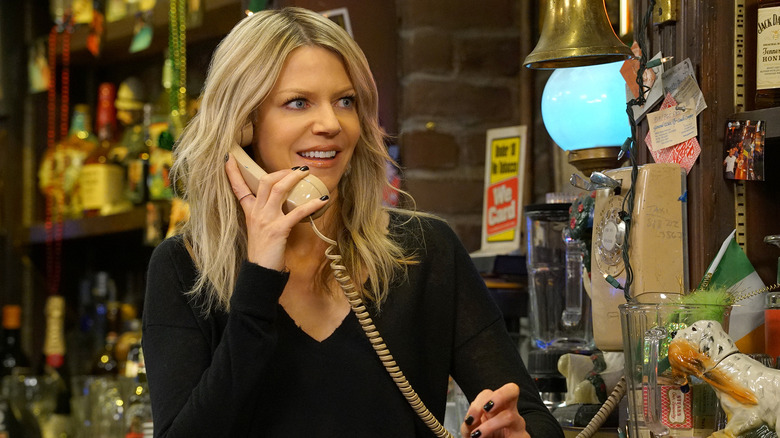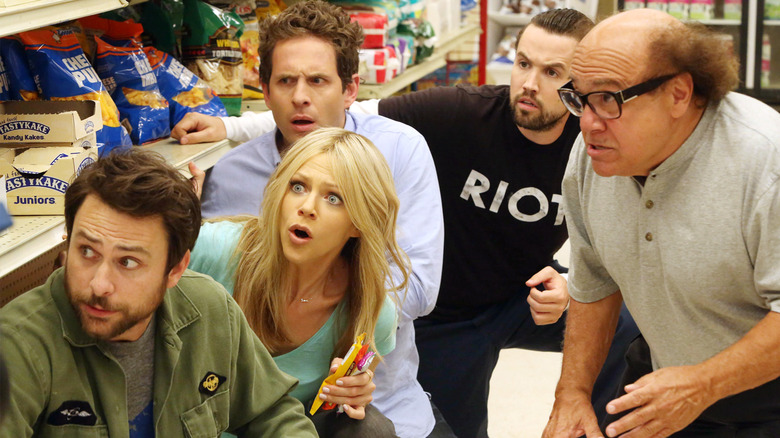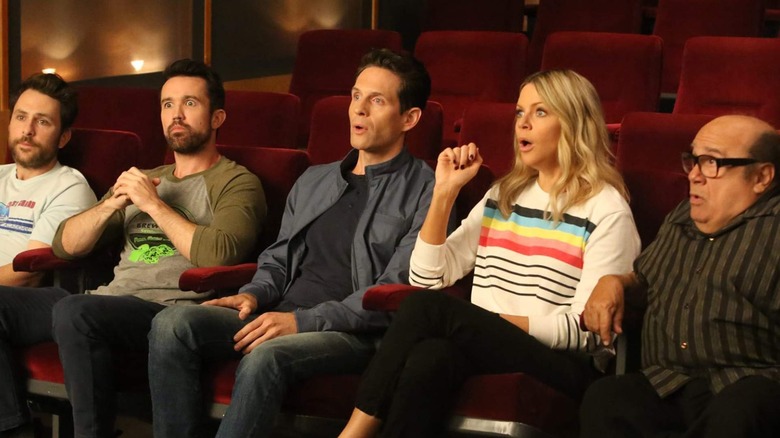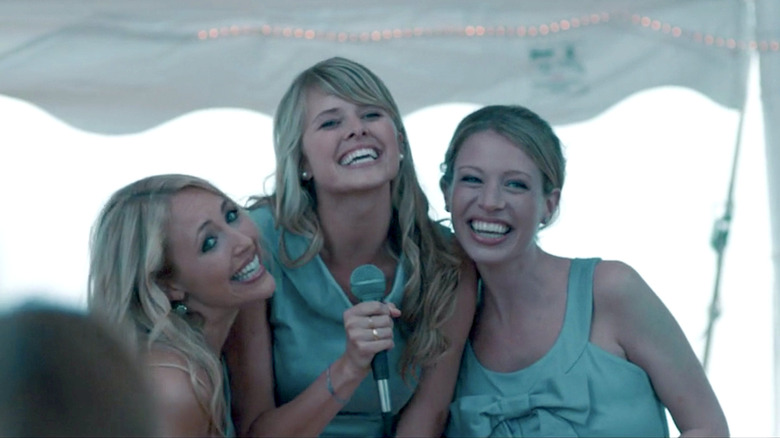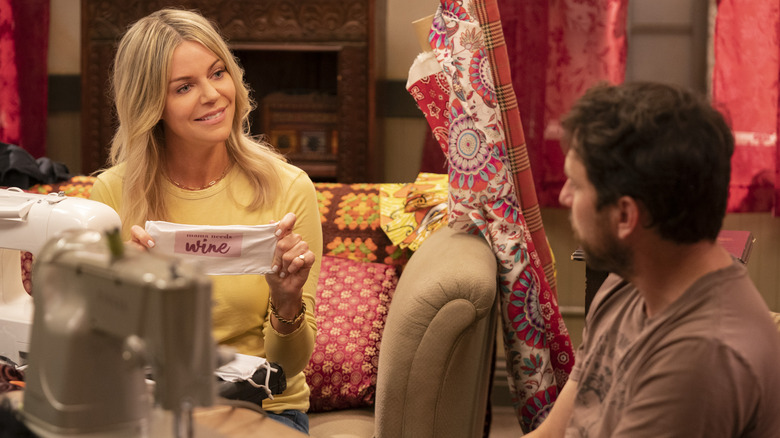Who Is Jordan Reid? It's Always Sunny In Philadelphia's Original Sweet Dee
For 16 seasons and counting, comedic force Kaitlin Olson has played the lovably repulsive Sweet Dee in "It's Always Sunny in Philadelphia." But fans of the series may be surprised to learn that the show almost had an entirely different Dee. In the unaired pilot, little-known actor Jordan Reid plays a very different iteration of the character that viewers have come to know and love. So whatever happened to Reid, and why was she the only original cast member that failed to make it into the series when it got picked up by FX? The truth is a little more complicated than you might think — and it might change the way you look at the show's creators.
Before it was "Always Sunny," series creators and stars Rob McElhenney, Charlie Day, and Glenn Howerton were struggling actors scraping by in Los Angeles. Each had landed small appearances in soaps and serials like "ER" and "All My Children," and Howerton had even starred in a single-season comedy spin-off of "That '70s Show" set in the '80s. Reid, too, had little more on her resume than an odd "Law & Order" appearance when she and the others started working on what would become the "Sunny" pilot. But here's the twist — she and McElhenney were dating at the time.
The way Reid tells it in her 2016 blog post, she and the three executive producers were the show's core group before it was even set in Philadelphia. They made up both the cast and the crew, holding boom mics and cameras for each other when they weren't in the shot. She was involved in the project from the very beginning and was always meant to star alongside the other three. Unfortunately, everything started to fall apart when her romance with McElhenney unraveled.
Why didn't Reid make it into the series?
After shooting the first iteration of the pilot in Jordan Reid's apartment, FX hired the gang to reshoot the episode for the network's consideration, and the project moved further and further out of Reid's hands. The core four made a pact that they would only do the series if FX picked up all of them, but their agreement quickly fell by the wayside when rifts began to form in McElhenney and Reid's relationship. Her first clue that their pact wouldn't be honored came before the pilot even went to series.
"One day I walked into the office that FX had set up for the show, and was surprised to find three desks: one for Rob, one for Glenn, and one for Charlie," she wrote. "They'd all been made executive producers. Very quickly — almost overnight — I went from being at the center of the project to standing on the periphery."
Reid tried to ignore the fact that her relationship with McElhenney would impact her involvement in "Sunny," but the truth soon became impossible to avoid. To the studio executives, she was "nothing more than another blonde actress," she realized.
Once her romance with McElhenney ended, so too did her involvement in the show. The studio already saw her as disposable, and as executive producers, the boys had absolute power to replace her.
"The pilot wrapped, and shortly afterwards I ended my relationship with Rob," Reid recalled. "During one of our break-up conversations, he told me in no uncertain terms that if I did not stay in the relationship, I would be off the show. I broke up with him anyway, and moved into the house that we had been planning to share all by myself."
How did Reid respond to being fired?
So, an entrepreneurial-minded reader might wonder, why didn't Jordan Reid just stay with McElhenney until she too was picked up for the series? Well, reader, you wouldn't be the first to ask.
"I can't tell you how many people have asked me why I didn't just stay in the relationship until the show was picked up and my contract was set in stone. The answer is that sleeping in a bed every night alongside a person I was not sure that I wanted to be sleeping with because there was money on the table felt like the worst kind of betrayal; a betrayal both of myself and of my relationship with a man who I loved still, despite the fact that we didn't seem able to coexist under the same roof [...] And besides, I honestly thought he was bluffing. I couldn't even imagine how a person who'd helped to create a show could end up tossed off of it; it didn't even seem like it could possibly be legal."
When the series was picked up, Reid was paid a measly salary amounting to that of a single episode and was sent packing. She never heard from Howerton or Day again, and their friendships ended then and there. The actor thought of taking them to court, but was concerned about the effect it would have on her career — and her mental health. She even met with an entertainment lawyer but was told that the case would be "long and expensive, and no sane casting director would touch [her] while [she] was embroiled in it." It even had the potential to end her career entirely, forever branding her as "the girl who sued FX."
What happened to Reid after getting the boot?
Despite avoiding a contentious court battle, Jordan Reid didn't score a whole lot of acting work after "Sunny." She did land a supporting role in the 2009 film "The Vicious Kind" starring Adam Scott, Brittany Snow, and J.K. Simmons, as well as a small part in the Andy Samberg and Rashida Jones-led rom-com, "Celeste & Jesse Forever." But it wasn't "Sunny" that ended Reid's career — it was Reid herself who chose to depart from the screen.
She was reluctant to share her "Sunny" sob story at first for fear of being seen as a bitter failure that was denied her chance at stardom, but Reid knows that isn't the truth. "[...] I also don't think I care anymore whether I 'seem' like a sad failed actress," she wrote. "I'm not an actress. I'm not sad. And I'm also not a failure."
Reid has since gone on to publish several interactive books like "The Big Activity Book for Anxious People" and "The Big Journal for Pregnant People," which she said had always been her dream. Meanwhile, her role in "Sunny" was filled by Kaitlin Olson, who went on to marry Reid's former boyfriend and start a family with him — the very future that Reid had imagined for herself. This was an undisputably bitter pill to swallow, but Reid took it like a champ.
But even though Olson was technically Reid's replacement, the version of Dee that Olson plays is almost unrecognizable from the one that Reid originally depicted in the unaired series pilot. So why and how has Sweet Dee evolved since she first appeared on camera in Reid's Los Angeles apartment?
What became of Sweet Dee?
The Sweet Dee that appears in the unaired pilot is almost an entirely different bird than the one we have come to know and despise on "Sunny." In fact, her nickname "Sweet Dee" wasn't ironic at all at first, but rather "a nod to her optimistic personality, which was originally intended to contrast sharply with the guys' misanthropy," Jordan Reid wrote.
When the part went to Olson, she had one request — that Dee be just as outrageous and cynical as the rest of the gang. She felt that the character they had written fell into the comedy trope of nagging the zany men around her, which denied her the same comedic range that the rest of the cast got to explore.
"There were three episodes that were already written that I had to do that were just very like, 'You guys. Come on, you guys. That's stupid, you guys,'" the "Hacks" star told Buzzfeed News in 2015. "But I was very clear about not wanting to do that."
The series creators admit now that they failed to flesh Dee out at first, despite Reid's affection for her character's 'sunny' disposition. "I don't think we did a great job writing her character the first season," Glenn Howerton added. "[Olson] pulled Rob aside, because he was the showrunner, and said she didn't want to do the show if her character wasn't funny."
From that point on, Dee became just as despicable as the rest of the gang. Olson agreed to stay on the project, and the show became all the better for it. "[...] I'm thrilled that I get to play a woman that isn't just, 'I'm a girl. I'm going to tell you guys when I think you're doing something bad,'" she told Entertainment Weekly in a 2009 interview. "Let the world be the voice of reason, and let us be ridiculous."
